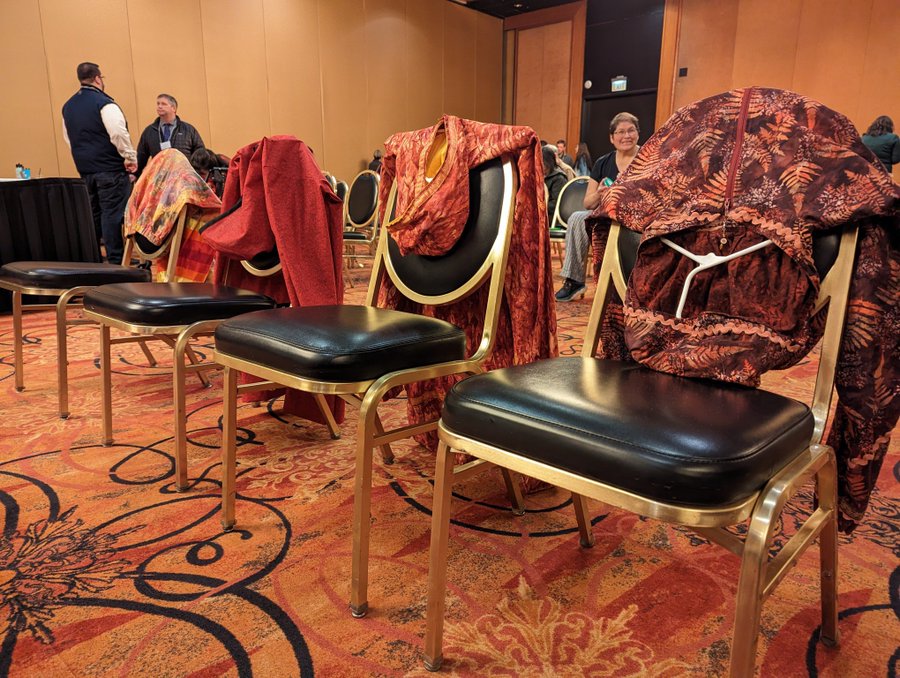
- Details
- By Native News Online Staff
Assistant Secretary of the Interior for Indian Affairs Bryan Newland (Bay Mills Indian Community) left the Road to Healing Tour at the Tulalip Indian Reservation for a week-long trip to Alaska to highlight investments being made through the Biden Administration's Investing in America agenda to advance tribal climate resilience and combat the crisis of missing and murdered Indigenous peoples.
On Monday, Assistant Secretary Newland joined Southeast Alaska area tribal leaders in Juneau for meetings focused on the Interior Department’s ongoing efforts to support sustainable economies across the state, protect subsistence rights, improve the land into trust process for Alaska Native tribes, and safeguard critical infrastructure.
Newland on Tuesday and Wednesday participated in the Not Invisible Act Commission’s public hearing in Anchorage. The hearing was part of the continued work by the members of the Commission, appointed by the Departments of the Interior and Justice, to develop recommendations to guide Congress and federal agencies on how to best combat the crisis of missing and murdered Indigenous peoples and human trafficking, as required under the Not Invisible Act. While there, Newland and the Commission heard from survivors as well as family members of missing and murdered individuals from the state on improving public safety in Alaska.
On Wednesday, Principal Deputy Assistant Secretary Wizipan Garriott and members of the Indian Affairs team visited Newtok Village, which is receiving $25 million from the Bipartisan Infrastructure Law and Inflation Reduction Act to begin voluntary community driven relocation as part of a new initiative and $135 million commitment announced last year for 11 severely impacted tribes to advance relocation efforts and adaptation planning. Located on the Ninglick River, the village is experiencing progressive coastal erosion from ocean storms and degrading permafrost. Multiple erosion studies have concluded that there is no cost-effective way to halt this process, and that the people of Newtok must relocate.
On Thursday, the Assistant Secretary traveled to the Native Village of Fort Yukon, which is receiving a $5 million grant as part of the same initiative to advance relocation efforts and adaptation planning. The grant will support the Tribe’s planning to reach decisions and prepare for increased climate resilience measures, with the community’s priority being the construction of a road that will also serve as a levee to protect the Village from Porcupine River flooding.
Assistant Secretary Newland’s visit also highlighted the Department’s recent announcement of more than $16 million over the next four years from the Bipartisan Infrastructure Law to enhance the resilience of ecosystems and salmon in Alaska’s Yukon, Kuskokwim and Norton Sound region through co-stewardship with Alaska Native tribes. The funding advances the new "gravel to gravel" initiative, the Department’s response to a resounding call for federal action from Alaska Native tribes and subsistence users.
More Stories Like This
Native News Weekly (August 25, 2024): D.C. BriefsNavajo Nation Mourns the Passing of Former Vice President Rex Lee Jim
Deb Haaland Earns Endorsement From Communications Workers of America Local 7076
University Soccer Standout Leads by Example
Two Native Americans Named to Democratic Congressional Campaign Committee's“Red to Blue” Program
Help us defend tribal sovereignty.
At Native News Online, our mission is rooted in telling the stories that strengthen sovereignty and uplift Indigenous voices — not just at year’s end, but every single day.
Because of your generosity last year, we were able to keep our reporters on the ground in tribal communities, at national gatherings and in the halls of Congress — covering the issues that matter most to Indian Country: sovereignty, culture, education, health and economic opportunity.
That support sustained us through a tough year in 2025. Now, as we look to the year ahead, we need your help right now to ensure warrior journalism remains strong — reporting that defends tribal sovereignty, amplifies Native truth, and holds power accountable.
 The stakes couldn't be higher. Your support keeps Native voices heard, Native stories told and Native sovereignty defended.
The stakes couldn't be higher. Your support keeps Native voices heard, Native stories told and Native sovereignty defended.
Stand with Warrior Journalism today.
Levi Rickert (Potawatomi), Editor & Publisher


